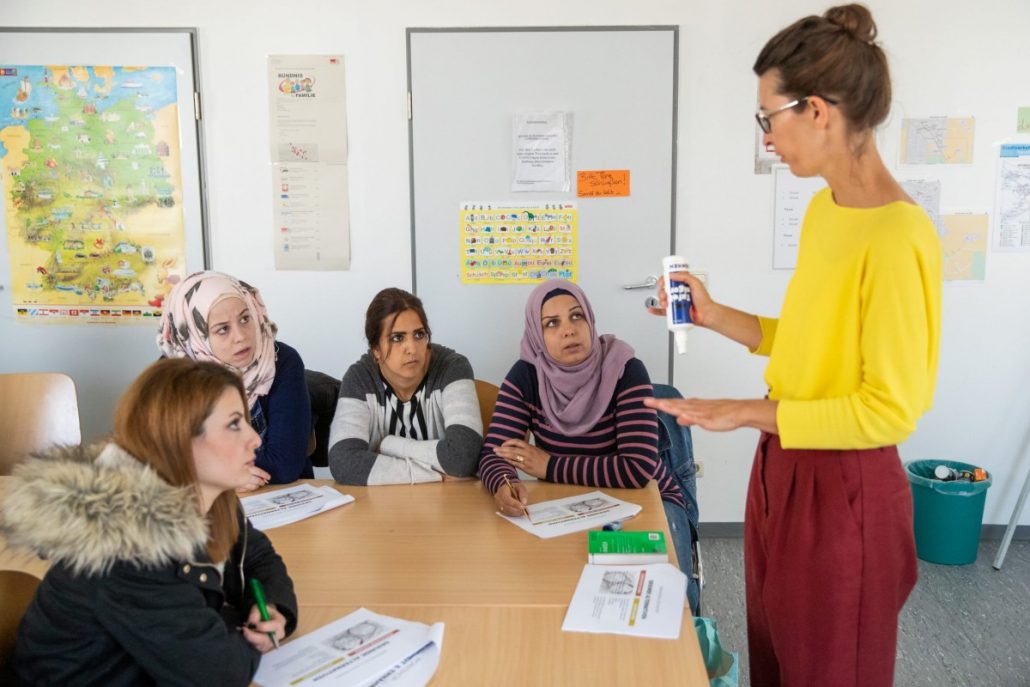Giving Refugees Employment Opportunities Through Remote Work
Reposted from the Center for Global Policy
Conflict in the Middle East has resulted not only in the loss of life but also in loss of livelihood for millions of refugees. The economic consequences of societies that have collapsed due to conflict have been exacerbated by the COVID-19 pandemic. This has created an even more urgent need for alternative solutions for refugee resilience.
Remote work has proved a viable way for much of the global workforce to be employed, and despite legislative and structural challenges, it also could be a feasible approach for refugee employment. Increasing remote work opportunities addresses not only refugee livelihoods but also the significant talent gap experienced by many U.S. companies, a situation which, if not rectified, could result in slower economic growth or economic contraction.
In order to fully operationalize this proposal, the Biden administration U.S. government needs to adopt a multi-stakeholder approach, engaging the private sector, international organizations, and NGOs that support refugee resilience. The U.S. government can lead the way domestically by engaging with local actors, and internationally by providing a successful model for other industrialized nations to follow.
Consequences of the Pandemic
As COVID-19 continues to significantly disrupt the world’s economies and societies, technology has changed the way we work. Companies no longer need only to depend on talent available in their physical location. Employment that is no longer bound by geography, takes into account the opportunities offered by technology, and utilizes online management and payment systems has created a new way for many to work: remotely.
At the same time, international attention has become focused on viable options for livelihoods for refugees and other displaced populations. Protracted refugee crises in the Middle East and elsewhere have placed host governments under significant pressure to accommodate the needs of individuals who have sought refuge in their countries.
As financial pressures, shrinking economies, and rising unemployment plague many refugee-hosting countries in the Middle East, the presence of large refugee populations has created additional burdens. There is a growing need to find innovative and viable solutions for employment, not only for migrant and refugee populations but also for host communities via a scalable, sustainable, and replicable model for job creation. Technology and remote work can provide this solution.
Thus far, the response of the international community and host nations to create jobs for refugees has been piecemeal, inconsistent, and siloed and has not resulted in wide-scale employment. The solution lies in the cooperation of various actors: governments, U.N. agencies and NGOs, training providers, and the private sector.
The COVID pandemic, and the accompanying technology revolution, has provided opportunities for nations interested in identifying employment solutions for migrating populations and the nations who host them. Host nations stand to benefit greatly from a larger pool of legal taxable income but must take steps toward legitimizing remote work for refugees previously excluded from legal employment. This policy change has the potential to positively impact the lives of refugees, making them less dependent on assistance and allowing international donors, including the United States, to reduce the aid provided to host countries.
The United States is well positioned to lead the movement to provide remote work for refugees. It is a country of migration with large refugee resettlement quotas, and it provides significant amounts of humanitarian and developmental aid. Most importantly, it hosts the world’s largest companies, many of which have recently announced they would be permanently allowing for remote work. Most crucially, the United States consistently experiences a skills shortage; essentially, there is insufficient talent to fill the available jobs in the U.S. economy. This places the United States in a unique position to lead a call for remote work for refugees.
A multi-stakeholder approach is required. This needs to involve the U.S. government (as well as those of other industrialized nations) to influence policy, both internationally and domestically, as well as to provide funding via its national aid agencies. Private actors are also needed to hire and mentor refugees, fund programs, and solve the structural challenges (financial and contracting) that hinder success. As U.S. companies are already leading the global transformation toward a remote workforce, targeted action by the U.S. government, both internationally and domestically, is needed to facilitate this. Training providers (NGOs and private companies) are needed to provide refugees with the skills to work remotely, and U.N. agencies and NGOs are needed to work with governments to facilitate cooperation among the various actors.
Barriers to Refugee Integration
With resettlement only an option for very few refugees and repatriation elusive due to protracted crises, local integration seems to be the only option for the majority of refugees. Host countries in the Middle East are reluctant to integrate refugees, viewing their presence as only temporary and a threat to their societies and economies. This perception of temporariness is reflected in refugees’ lack of access to labor markets.
In many refugee-hosting countries in the Middle East, refugees are denied access to employment due to a combination of legislative and structural barriers. Governments impose protectionist mechanisms that deny or limit legal access to employment in the domestic labor market for refugees. Other barriers exist, related to quotas, denial of employment in specific sectors or professions, administrative procedures, or lack of freedom of movement. Without the ability to work formally, self-reliance is almost impossible for refugees.

Governments of refugee-hosting countries need to be convinced that remote work for refugees is a win-win. There is a political and economic argument to support this: If refugees (and the host community) can be employed and paid by global companies, refugees would be more financially independent and require less financial assistance from their host government and the international community. Unemployment rates would decrease, and foreign revenue flows into the country via salaries to workers would increase, promoting economic development. Moreover, governments would receive a greater share of income tax from newly employed individuals.
Employment Challenges for Refugees
Despite the well-understood benefits of providing refugees access to livelihoods via remote work, many obstacles have prevented this. Middle East refugee-hosting countries enforce protectionist labor laws that restrict refugees from accessing employment. In Lebanon and Jordan, Syrian refugees only have the right to work and acquire work permits in limited sectors (for example agriculture and construction). In Turkey, while Syrian refugees are allowed to work in any sector, employment is restricted by a quota set by the government (one Syrian for every 10 Turkish nationals, so Syrians cannot make up more than 10% of the labor force). Despite the legal possibility of obtaining work permits, the majority of employed Syrians work illegally. This has meant that many refugees are underemployed or work informally, prey to exploitative employers and often earning less than the minimum wage in substandard working conditions.

Moreover, Middle East countries where the majority of refugees are hosted do not have sufficient employment opportunities for all refugees that need jobs. They are stretched in their capacity to provide employment for native populations, and the presence of refugees has complicated solutions.
The Syrian crisis has had a significant impact on the economies in the Middle East. The economies of Jordan and Lebanon have been negatively impacted by the crisis. In Jordan, according to a report by the Ministry of Planning and Interior, the country has overall witnessed a 30% increase in youth unemployment since the start of the Syrian crisis. Likewise, in Lebanon, there has been an increase in unemployment, especially among the youth and low-skilled workers. The current economic collapse and political crisis in Lebanon has both impacted the Lebanese population and placed refugees in an even more vulnerable situation.
The economic advantages of hosting refugees varies based on the host nation’s approach to the question of legal employment. This results in distinctly different outcomes in national economic successes directly related to differences in the employment status of their refugee populations. In the United States and other nations where refugees have access to legal employment and then citizenship privileges (Turkey gave citizenship to a small number of Syrians who were professionals), the economic benefits of refugee programming becomes clear: In the United States alone, employed refugees generate over $4 billion of income annually and have played a critical role in the revitalization of rural communities. This is not the case in Middle East host countries where refugees have temporary protective status and limited access to employment.
International attention has become focused on viable options for livelihoods for refugees and other displaced populations. The interest in innovative solutions for employment, for migrant and refugee populations and also for host communities, has presented an opportunity for a new narrative to be considered.
Challenges and Opportunities
While remote work for refugees holds great promise, there are many political, social, and economic obstacles.
International remote work remains a grey area legislatively. The application of labor laws and social security for international remote workers remains unclear, including questions of under which jurisdiction the individual is classified while working for a company headquartered in one country and residing in another. Only recently have some countries (Barbados and Estonia) and cities (Dubai) embraced the idea of the digital nomad, residing within their borders, spending in the local economy, but not employed in the local labour force. The situation is even more complicated for refugees, many of whom lack the right to work in their country of residence and thus often work in the informal sector.
The legal employment status for refugees who would work remotely requires careful consideration. While remote working aims to provide refugees access to a dignified livelihood, it should not push refugees further along a path of informality and place them in more precarious situations. Appropriate legal frameworks are required to formalize employment for refugees and guarantee adequate labor protection. Careful framing of these issues to host governments would be required so that it would be perceived as a win-win; refugees are gainfully employed in a manner that does not directly compete with the local population; and there is an injection of cash from the global private sector into the host economies, a sort of indirect-direct foreign investment.
One result of refugees’ informality in the labor force is their lack of access to financial institutions. A history of informal work has meant that many refugees (as well as significant segments of host community populations) are paid in cash. While this may not be problematic for individuals with informal employment in the places they reside, this would be difficult for remote workers. While money exchanges offer the option to transfer funds, this is not without cost and is often unmanageable on the small amounts that many refugees might earn. A secure online payment mechanism is necessary, perhaps linked to an established financial institution. The mechanism should provide refugees with the ability to save and be accessible as they cross borders, with low transaction fees.
In order for refugees to successfully work remotely, they require appropriate skills. They need technical skills to be able to do the job, but more importantly, they need the core/transferable skills to work remotely, as well as the knowledge and ability to navigate the digital space. There is a business case for hiring refugees, untapped talent that would remain loyal to their employers at a cost lower than employees in Europe and America. Hiring refugees also contributes to diversifying workforces, a factor important to many companies as research has shown that diverse workforces show improved overall output. Governments, and in particular the U.S. government, could play a role in this. Through the aid agency, USAID, Washington could provide funding to organizations that provide training to refugees. Moreover, training providers could allow the standardization of qualifications by providing recognized certifications. This would make it easier for companies to recruit refugee talent.
The most significant challenge is engagement from the private sector to actually hire refugees. While there has been interest among businesses to engage and support the lives and livelihoods of refugees, there has been no wide-scale hiring of refugees remotely. President Barack Obama’s 2016 Call to Action to the private sector to address the global refugee crisis and the establishment of Hamdi Ulukaya’s Tent Partnership for Refugees show that there is willingness among the business community to engage in supporting refugees and demonstrate how governments can be effective in promoting this type of action. However, more needs to be done by governments to facilitate refugees’ employment. Governments can incentivize companies to hire refugee talent remotely. For the interest of businesses to be translated into wide-scale employment of refugees remotely, the challenges need to be addressed by governments and the international community so that a trustworthy and systematic pipeline of talent is presented to the private sector.
Refugee Skills Training
To date, governments and the international community have not promoted economic programming in the Middle East for refugee populations. This could easily change, however, due to the range of training programs in the region that could facilitate remote work with global companies. Organizations such as ReBootKamp, Chams and Re:

These programs address the problem of skills. Refugees across the region who have the aptitude for digital employment have access to training that can prepare them with both the technical and core/transferable skills for remote work. The missing piece is jobs, and this requires the engagement of the private sector in a public-private partnership, with governments and the international community developing and directing these alliances.
How This Can be a Win-Win
The exact impact of U.S. companies transitioning to remote work due to COVID has yet to be decided. What is certain is the positive impact of purposeful remote working policies that had been implemented by companies before the pandemic. Companies benefit from access to talent globally; improved productivity, agility, scalability; reduced turnover and improved retention; and increased profits. Moreover, remote work means that companies looking to hire are unrestricted by immigration controls and migration policies.
The United States has a talent shortage. According to the U.S. Department of Labor, by the end of August 2020 there were 6.5 million job openings and only 5.9 million hires during the month. This pattern has been consistent. The majority of U.S. employers (69%) are struggling to find skilled workers, and report that IT and sales and marketing positions are the most difficult roles to fill. These positions are easily done remotely.

As companies continually struggle to find the talent they need to grow their businesses, the U.S. economy is negatively impacted. One solution, employed by many companies, is to find talent overseas. Yet apart from the cost of recruiting and relocating talent from abroad, the issue of migration is politically charged. Accessing global talent remotely can help the United States address its talent gap.
Immediately including the option of remote work in political discussions around refugee employment could position the United States as leading the effort to support dignified employment for refugees. Leading the effort for dignified remote livelihoods for refugees may counteract the negative attention that the United States has received as a result of decreasing refugee quotas and funding for international institutions as well as relief efforts, allowing the United States to regain standing among the international community.
The global talent gap has been widely acknowledged. As many U.S. (and global) companies struggle to find the talent they need at a reasonable cost, a business case can be made for hiring refugees remotely. The untapped workforce represented by refugees who have been trained with the technical and core/transferable skills could address the skills shortage. The United States currently imports much of the talent needed. By hiring refugees remotely, U.S. companies can save, benefit from having a diverse workforce, and provide social impact. Remote work allows for the democratization of work, allowing companies to achieve true diversity in their workforce by hiring from outside their national borders.
By supporting remote work for refugees, the United States addresses its talent gap without necessarily having to increase its migration quotas. At the same time, it positions itself as a trailblazer, supporting a new narrative for dignified refugee employment.
Recommendations
The operationalization of remote work for refugees requires a multi-stakeholder approach. The U.S. government can lead the way both domestically and internationally, providing the path for other industrialized nations to follow.
- Encourage and incentivize refugee-hosting countries to establish appropriate legal frameworks so that refugees are able to work formally and be protected by labor laws.
- Link the provision of international assistance for refugee-hosting countries to the regularization of remote employment for refugees.
- Build the narrative that remote work for refugees is a win-win: Refugees (and the host community) can be employed and paid by U.S. (and global) companies, addressing their talent gap in a way that does not have a significant impact on migration quotas. This means that refugees are more financially independent and require less financial assistance; foreign revenue flows into the host country via salaries to workers, and governments receive a greater share of income tax.
- Facilitate cooperation between large multinational companies and host countries for remote employment of refugees.
- Facilitate programming, via funding from U.S. governmental aid agencies such as USAID and U.S. foundations, to train refugees and members of the host community in a range of digital skills that match labor market demands and core/transferable skills for remote work.
- Facilitate cooperation between refugee-hosting governments, NGOs/INGOs, U.N. agencies, and the private sector.
- Work with the United Nations, NGOs, and refugee training providers to spearhead a global initiative so that American companies seeking to recruit to address their talent gap have a dedicated source of global refugee talent with the skills to work remotely.
- Work with training providers of refugee talent to standardize and recognize certifications to make it easier for companies to recruit refugee talent.
- Develop policies to incentivize American companies to expand their remote employment hiring to include refugees (as well as members of the host community in refugee-hosting countries) to address their talent gap. This could be done in parallel with the work visas already provided to foreign workers to work in the United States. These incentives could stipulate necessary components that are required to operationalize refugee remote work such as training, technical and financial assistance to training providers, and financial management to address unbanked individuals.
Lorraine Charles is a Research Associate at the Centre for Business Research, University of Cambridge and Co-Lead of the Digital Skills and Digital Work project at the Centre for the Study of Global Human Movement, University of Cambridge. She is Co-founder and Executive Director of Na’amal, a social enterprise that provides skills training, mentorship and links to the private sector to support refugees and other vulnerable populations so that they can access dignified livelihoods, particularly remote work. She is also Project Affiliate for Refugeework.net, a research project at the University of Edinburgh, which conducts research on digital livelihoods for refugees.
The views expressed in this article are those of the author and not an official policy or position of the Center for Global Policy.





















2021
1,756 views
views
0
comments